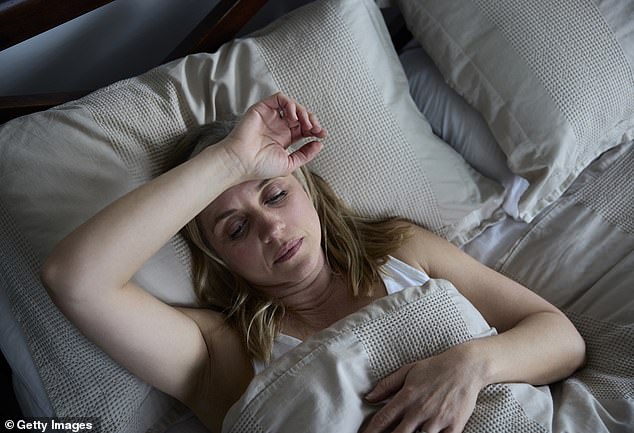Dr. GINNI MANSBERG: The potentially fatal symptom that one in three women experience in their 40s – and how to tell if you’re likely to get it
Many of the physical changes women experience during the transition to menopause can be a shock to the system.
The hot flashes, the vaginal dryness, the sleep problems: they’re all unpleasant, but at least not fatal.
But there are potentially fatal symptoms associated with perimenopause – which typically begins in women aged 40 to 44 and ends when they go 12 months without a period – that are rarely talked about.
Brain fog, angry outbursts, anxiety and – most worrying of all – clinical depression can all be caused by fluctuating hormones associated with the end of a woman’s reproductive years.
These symptoms can affect any woman, but are usually experienced by people who have never suffered from mental illness in the past.
Perimenopause expert Dr Ginni Mansberg told FEMAIL that women can wake up, burst into tears and feel like they have to stay indoors forever – all because of the spiking hormones they experience during the menopause phase of their lives.
When they go to their GP to find a cure for the sudden decline in their mental health, they are pumped full of antidepressants that ‘don’t work’.
‘They are still just as depressed or anxious. In fact, perimenopause is the time when a woman is most likely to die by suicide,” said Dr. Mansberg.
Dr. Ginni Mansberg reveals the deadly side effect of perimenopause
The anxiety and depression can be debilitating and cause women to give up their careers, withdraw from friends and family, and develop something akin to agoraphobia within weeks.
‘Many of these women have had a terrible time on the pill, something some doctors are also trying. But the women know that taking the pill would be a disaster,” she said.
Dr. Mansberg said researchers are investigating perimenopausal mental illness to see if they are linked to genes that cause premenstrual dysphoria, a severe form of PMS characterized by more intense mood swings.
She said these women are likely more sensitive to the hormonal fluctuations of perimenopause, which cause the more severe feelings of anxiety and depression.
“Antidepressants don’t work, but 76 percent of women feel better when treated for perimenopause,” she said.
‘If you understand what is going on, the prognosis is excellent. But you need treatment, otherwise it will remain terrible.’
One of the main treatments for perimenopause symptoms is hormone replacement therapy (HRT). This is a drug that replaces the female hormones estrogen and progesterone, which decrease during menopause.
HRT takes the form of pills, patches, gels, creams and more.

During perimenopause, women are most likely to commit suicide
Some women fear treatment, but Dr Mansberg said there is no escape for those who have severe symptoms.
“Get treatment so you can get past it and be yourself again,” she said.
One in three women suffer from anxiety or depression during perimenopause.
‘These women burst into tears in the middle of the supermarket. They say they no longer feel like themselves. They are a bit overwhelmed by everything and feel paranoid. They lose their shit against everyone,” she said.
Dr. Mansberg said it breaks her heart to see so many women suffering so deeply with their mental health during perimenopause, despite treatments being readily available.
Research shows women are more than twice as likely to develop bipolar disorder in the years leading up to menopause
By Shaun Wooller, Health Editor
Recent research shows that women are more than twice as likely to develop bipolar disorder in the years leading up to menopause.
Researchers examined data from 128,294 women in the four years surrounding their last menstrual period.
Analysis found that during perimenopause there was a 112 percent increase in bipolar disorders, while the occurrence of depressive disorders increased by 30 percent.
Perimenopause occurs when a woman has menopausal symptoms such as anxiety, mood swings, and brain fog, but still has a period.
Study leader Professor Arianna Di Florio from Cardiff University said: ‘During perimenopause around 80 per cent of people develop symptoms, but the impact on the onset of serious mental illness was unknown.

Recent research shows that women are more than twice as likely to develop bipolar disorder in the years leading up to menopause (stock image)
‘In my clinic I discovered that some women, who previously lived lives without any experience of serious mental health problems, developed serious mental illness around menopause.
‘I feel a duty to the women I work with.
‘I wanted to give them and other women answers to the question of why this terrible thing happened to them.’
Professor Di Florio said the findings could help provide additional support to women who have been ‘previously left in the dark’.
“Research like this is vital because women are experiencing these profound changes in their lives and bodies and are currently being let down by the lack of detailed understanding of these changes,” she added.
‘We have been able to expand our knowledge of the mental health changes associated with perimenopause, which can help provide explanations, diagnoses and support to women who have previously been left in the dark about what is happening to them.’
The study, published in the journal Nature Mental Health, was carried out in collaboration with the charity Bipolar UK and the UK Biobank.
Clare Dolman, ambassador for Bipolar UK and lead of patient and public engagement on the project, said the findings could be ‘life-saving’.
She added: ‘This study is extremely important because it shows for the first time in a very large sample that the transition to menopause has a measurable impact on women’s mental health.

Bipolar disorder is a mental illness that affects your mood and can go from one extreme to another (stock image)
‘For me, this confirms what we have seen and heard ourselves from women with bipolar disorder; that hormonal change is a very important factor in mood disorders and one that deserves to be thoroughly investigated.
“As a woman with bipolar disorder who has gone through menopause, I look forward to the research community recognizing the importance of this funding.
‘The studies will allow us to predict an individual woman’s risk of becoming unexpectedly ill at this stage of life. That knowledge can be life-saving.’
The study focused on first experiences with psychiatric disorders during perimenopause and did not examine associations with the recurrence of pre-existing psychiatric disorders.
Bipolar UK said further research targeting people with a history of mental illness is needed.
